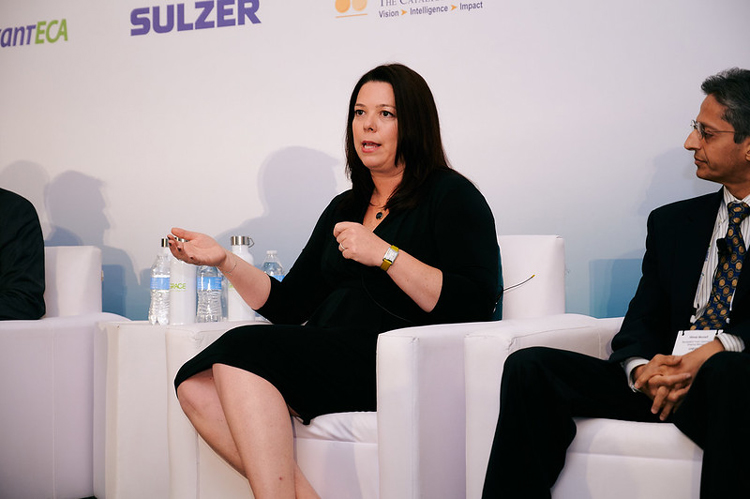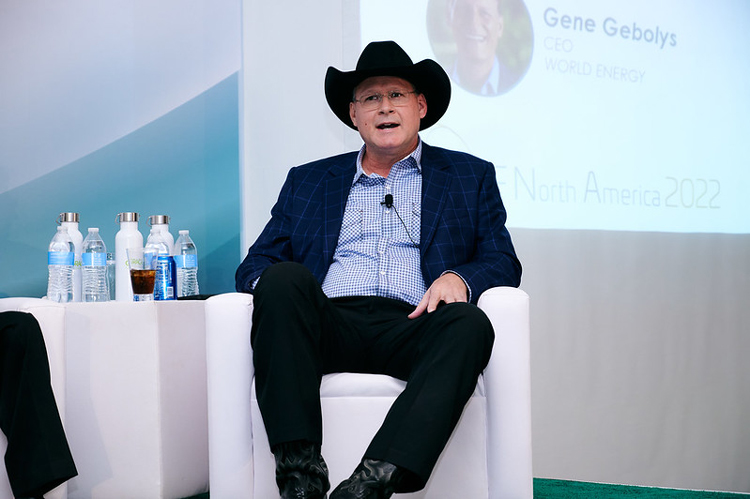The transition is a journey with many steps. Cooperation and collaboration are needed between different sources of energy and the many opportunities available today must be embraced in parallel. Increasing the volume of renewable fuels produced and marketed is without doubt a key pathway that we continue to see refiners in North America take to cement place their place in a low carbon future. John Florez, Associate Director, Oil & Gas, Boston Consulting Group was joined by Jennifer Haley, President & CEO, Kern Oil & Refining Co, Eric Zimpfer, VP Cherry Point Refinery, BP, Nick Andrews, CEO, USA BioEnergy, Gene Gebolys, CEO, World Energy and Himal Munsif, Sr. Manager Downstream Strategy, Chevron to discuss the rise of bio and renewable fuel production, the longer-term role for conventional refineries and some of the challenges being faced along the way.
Kicking off the discussion, our panellists reflected on how we have seen refineries in North America start their transition to a net zero future, and some of the challenges they’re facing on that path. The first point raised was that the term transition is a bit of a misnomer, rather it's an evolution. As put by one of the panellists, “we're on this boat in the ocean, we don't really like our boat, it’s a bit dirty, could be cleaner and more efficient, but we're setting fire to the boat before we have another boat”. We have to recognize that we're going down a dual path and improve what we have whilst building something new. All projections indicate that we will continue to have fossil fuels, and use existing infrastructure for decades to come.

From left to right: L-R John Florez, Associate Director, Oil & Gas, Boston Consulting Group, Gene Gebolys, CEO, World Energy, Eric Zimpfer, VP Cherry Point Refinery, BP, Jennifer Haley, President & CEO, Kern Oil & Refining Co, Himal Munsif, Sr. Manager Downstream Strategy, Chevron, Nick Andrews, CEO, USA BioEnergy during ESF North America, Houston 2022
Looking specifically at the pathways of our panellists’ companies. First Kern, one of the last small independent refiners in California producing 1% of the state’s gasoline, 2% of the diesel, is a renewable fuel pioneer. Producing renewable diesel since 2009, they co-process tallow through a repurposed hydrotreater. The company exemplifies that dual path, improving existing gasoline and diesel production whilst innovating toward next generation renewables.
We have to recognize that we're going down a dual path and improve what we have whilst building something new
It was commented that prematurely cutting investment in hydrocarbons risks crashing the system, and risks people losing the political and social will required to effectuate real change toward renewable fuels. Sometimes the conversation gets too myopic around the carbon and we have to recognize and remember that providing affordable, reliable clean energy should be the overarching goal.
Next perspectives from BP who have recently re-branded from an integrated oil to integrated energy company to reflect the fact that future energy will come from a diverse variety of sources. A refinery should not be seen as one or the other, but both. The world needs energy, our communities need energy and BP will continue to invest in existing assets to make energy in a safe, compliant, reliable and efficient manner.

Expanding further, $200 million has been invested to lower the carbon emissions of existing operations, but also in new technologies; renewable diesel, and alternate feedstocks. The transition is a journey, a marathon, and as such, refining will continue to be around for a long time.
Like BP, where policy supports it and where customers demand it, Chevron and many other traditional refiners are looking at alternatives for low carbon initiatives to incorporate in their portfolios through the build of new, or conversion of existing, hydro processing units to execute the HEFA pathway, or co-process in the FCC.
Perspectives from a different end of the continuum were shared from World Energy who have been active in advanced biofuels for 24 years. The industry is experiencing a moment in time in which traditional refiners and integrated energy providers are finding a middle space, with significant value to be found in the synergies. Despite being very different businesses with very different supply chains, and go to market marketing approaches, there is overlap when it comes to regulation and distribution.
The transition is a journey, a marathon, and as such, refining will continue to be around for a long time
Finally, USA Bioenergy, capture and sequester the CO2 from the process streams of their advanced biorefineries that turn wood waste into sustainable aviation fuel. As a result, the company is able to earn a carbon intensity score of a negative 250 or lower, as well as help the airlines who buy their very clean carbon negative fuel to meet some of their carbon neutrality goals.
Concluding the first part of the discussion it was commented that the societal need is so big we have never faced anything like what we're facing right now. The quality of life of human beings has increased in large part because of fossil fuels. Today, we're trying to imagine a world in which we have all the advancements of fossil fuels without the extremely serious implications of fossil fuels. The challenge ahead of us needs an all-hands-on deck approach, that support us collectively to keep taking the steps that we can take, as fast as we can take them. We have some pieces of the puzzle but the puzzle is not complete yet.
Innovation requires failure
The next question for our panellists was how the different players of the industry can work together, sharing talents or technologies to help the industry as a whole, move forward not only towards decarbonization goals, but also to maintain that low cost, reliable energy supply.
In many states, clean energy has become very elitist, leaving communities behind, echoing the need for an all of the above approach and improving what we currently have. Perfect is the enemy of good and sometimes you have to try things and see how it works out. Innovation requires failure and, as such, collaboration is critical. It’s no longer a case of different industries sitting at opposite ends of the table. Whether it's the oil industry or the Agri industry, supported by consistent policy across the board, it’s those collaborative, innovative partnerships that will bring those next generation renewable fuels to market.
It’s no longer a case of different industries sitting at opposite ends of the table
Today’s refiners are no longer simply in the business of providing fuel, but in reducing carbon. Customers today need us to deliver carbon reduction, whether it's through carbon capture to create blue hydrogen or, wind and solar to produce green hydrogen, sustainable aviation fuel, renewable diesel and so on.

Jennifer Haley, President and CEO, Kern Oil & Refining Co during ESF North America 2022
A PR problem
Discussion moved to talent and to what degree the energy transition has helped retain and build the industry’s funnel of talent. Not surprisingly today's generation of chemical engineers are not as excited or passionate about working for the oil and gas industry as we saw 20-30 years ago. Steering the conversation towards renewables and the need to decarbonize presents significant opportunities to help attract talent. Touching upon a point made previously, it's not one or the other. Refineries, as manufacturers of energy are part of the solution, that continue to evolve.

Ultimately, it’s a PR problem that needs fixing. Negativity fills a communication vacuum, and we need to get better at talking about the industry’s key role as part of the solution. Beyond that, today’s graduates have a mission driven mindset. Those companies that are mission driven and can articulate their mission clear and effectively will attract the talent.
Lipids are over saturated
A lot of focus to date has been on HVO or cooking oil as feedstocks focused on SAF or renewable diesel. Next our panellists considered what other feedstocks, and renewable materials need to be part of the discussion.
Feedstock values have doubled in the last year or so, and despite the higher prices for buyers, it’s positive for the overall aggregated supply of feedstocks. Adding to that, the cure for high prices is high prices which presents an opportunity of innovation for the industry.
Waste to fuels, especially those waste products not being utilized today present a great opportunity for the creation of next generation low or negative carbon intensity fuels.
The challenge for woody and Agri waste is the transportation but we are witnessing some exciting innovations around smaller, more nimble facilities co-located at the feedstock source. Fats and waste oils are what got us to the dance and where we have seen the most progress to date.

Nick Andrews, CEO, USA BioEnergy
Looking forward we need to build a portfolio of feedstocks beyond just the commodity seed oils or waste oils with lower carbon intensity (CI). Whether it's municipal waste, woody biomass, algae etc, we need consistent policy support to enable them and make them viable. We need streamlined pathway approvals and timelines. Furthermore, we need first movers, and it’s not always obvious at the time that you need to move.
Digging deeper into the transportation challenge, in the context of the US, between 2021 and 2026, five times the production of renewable diesel is forecast to come online. Whether it's feedstocks or finished products, the expectation is that it will move from predominantly the Midwest, to policy enabled markets, aka California on the West Coast.
Discussion moved onto policy support. All too often we see policies that don't necessarily make sense to the boots on the ground. We need to build the relationship with the regulators that enable us to shift the conversation to what makes sense policy wise and continue to brand ourselves as the engine that drives the transition, and reinforce that the industry is a big part of the solution.
While the world needs energy, there is a role for refineries
.jpg)
Final conversation of the panel discussed refinery shutdowns, conversions and closures, and to what extend we expect to see the trend continue.
Events of the last three years since the start of the pandemic have been a rollercoaster for supply and demand, and highlighted our vulnerability to energy shocks.
Today’s strong traditional refining margins have naturally raised questions for the transition but taking a step back from short term gyration, and looking 5-10 years from now, the only trend we can be certain of is to increase investment in low carbon, it’s what our customers want, and our planet needs.
Fundamentally, depending on its footprint and its configuration every refinery is going to have their own view of what their portfolio looks like, and what's right for them. The idea that all refineries are going to shut down or convert away, we don't see. Conversely, the idea that refineries will continue doing exactly what they are doing today and not have to evolve, we don't see. The truth is going to be somewhere in the middle. Each company, each refinery, must come up with own their view of how they best make the transition and how they do this whilst continuing to provide, in a responsible way, our communities with the energy that they need. Ultimately while the world needs energy, there is a role for refineries to play.

Gene Gebolys, CEO, World Energy & Eric Zimpfer, VP Cherry Point Refinery, BP
